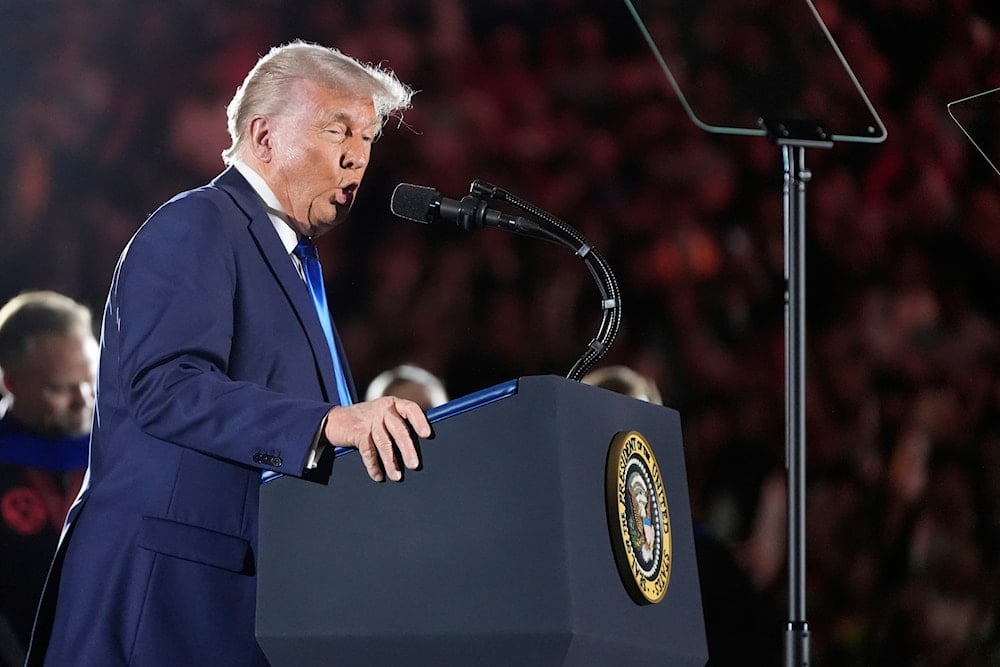'Alarming deterioration' of US press freedom under Trump, says RSF
Reporters Without Borders (RSF) flags an alarming drop in press freedom in the United States during Donald Trump's second term, alongside a global rise in media repression.
-

US President Donald Trump gives a commencement address at the University of Alabama on May 1, 2025, in Tuscaloosa, Alabama. (AP Photo/Manuel Balce Ceneta)
Reporters Without Borders (RSF) raised the alarm over what it describes as "an alarming deterioration in press freedom" in the United States during President Donald Trump's second term, as well as "unprecedented" challenges faced by independent media globally.
The Paris-based organization, which has monitored press conditions for 23 years, released its 2025 World Press Freedom Index, showing the index had fallen to its lowest point ever recorded.
The annual review noted, "For the first time in the history of the index, the conditions for practising journalism are poor in half of the world's countries and satisfactory in fewer than one in four."
Moreover, RSF’s editorial director, Anne Bocandé, pointed to mounting economic pressures that have made it increasingly difficult for independent outlets to survive, warning that the financial strain weakens fact-based journalism worldwide.
US sees alarming drop under Trump
RSF specifically criticized Trump’s administration for accelerating the decline in press freedom in the United States, reporting that the country fell another two places in the global ranking, now standing at 57th, just below Sierra Leone.
According to RSF, Trump exacerbated media difficulties by cutting funding for state-backed broadcasters like Voice of America and Radio Free Europe/Radio Liberty, as well as slashing US development aid that previously supported independent media abroad.
"In the United States, Donald Trump's second term as president has led to an alarming deterioration in press freedom, indicative of an authoritarian shift in government," RSF stated, adding that "his administration has weaponised institutions, cut support for independent media, and sidelined reporters."
Economic pressures
Bocandé noted that while online advertising revenue continues to rise, reaching $247.3 billion in 2024, most of it is captured by major tech corporations such as Facebook, Google, and Amazon, leaving independent media with a shrinking share.
"When journalists are impoverished, they no longer have the means to resist the enemies of the press, those who champion disinformation and propaganda," she warned.
RSF also highlighted the rise of "news deserts" across large parts of the United States, areas where access to local journalism is virtually non-existent.
In a recent escalation, Trump announced he was considering legal action against The New York Times, continuing his pattern of targeting media outlets critical of his administration, also filing a lawsuit against media conglomerate Paramount, alleging that an interview with former Vice President Kamala Harris was edited unfairly.
However, legal experts have dismissed the case as unlikely to succeed due to protections enshrined in the US Constitution.
The Committee to Protect Journalists (CPJ) echoed RSF’s concerns, warning of a rising tide of threats against the press in the United States and urging news organizations to unite in defense of journalistic freedom.
The report also condemned attacks on Palestinian journalists in the Gaza Strip amid "Israel's" ongoing aggression.
"In Gaza, the Israeli army has destroyed newsrooms, killed nearly 200 journalists and imposed a total blockade on the strip for over 18 months," RSF stated, adding that "Israel" dropped 11 more places on the index to 112th, with RSF noting that it "continues to repress its own news media.”

 3 Min Read
3 Min Read








